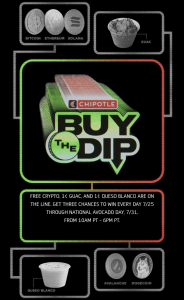Crypto Curious: 3 ways crypto is redefining loyalty programs
It seems like every brand has a loyalty program these days, but some brands are going above and beyond while others are doing the bare minimum. With consumers being more price-sensitive in response to inflation and the current economic downturn, brands have an opportunity to differentiate themselves by expanding their loyalty ecosystems and going beyond what is expected.
There are some clear downsides to most traditional loyalty programs in the credit card or travel industries: the true value of the points/miles you accrue can be unclear, there can be fine print restrictions and expiration dates, and rewards tend to be devalued over time. To maximize loyalty potential, customers have to use up the rewards they’ve accrued on some regular cadence. For many, forgotten rewards are a missed customer touchpoint.
In order to understand how crypto is redefining loyalty programs, we’ll consider three brand use cases.
1. Crypto-Inspired Rewards
Even for brands that are happy with their best-in-class loyalty programs, like Starbucks Rewards or Sephora’s Beauty Insider or Chase Ultimate Rewards, there are lessons to be learned from the crypto space.
Many crypto offerings have a benefit of governance built in, where the more tokens you hold the more votes you get towards decision-making around what happens with the crypto network, a model which operates similarly to shareholder votes in a public company that investors are allocated. These governance tokens incentivize super users to hold their “loyalty points” so they have more influence when it comes time for a vote. With a similar model, Starbucks could allow loyalty customers to give input on their next seasonal drink offering, Beauty Insiders could vote on Sephora’s next influencer collaboration, and a Chase Freedom cardholder could decide between two possibilities for next quarter’s rotating cashback category. This would be a unique customer engagement tactic, and the additional utility of being able to vote would add to the perceived value of your loyalty points. This could ultimately result in customers being more likely to participate in future products and offerings that they influenced.
2. Crypto Promotions
Recently Chipotle offered a “Buy The Dip” promotion, turning the stock market strategy into a game where it gave away $200,000 in crypto and 650,000 promo codes for 1-cent guacamole and queso in a week-long online event that coincided with National Avocado Day. While the prizes had a little something for everyone, whether interested in crypto or not, the promotion demonstrated the fast casual restaurant’s interest in reaching out to new consumer segments. This wasn’t Chipotle’s first crypto giveaway, as they offered a similar promotion in early 2021 called Burritos or Bitcoin to celebrate National Burrito Day.
The “Buy The Dip” promotion was possible through a collaboration with Coinbase, since an account on that exchange was required to claim any crypto prizes. Meanwhile, Chipotle also used the opportunity to advertise that they now accept crypto as a payment method via another partnership with the digital payments platform Flexa.

3. Crypto Rewards
Crypto rewards have become a trendy offering, from Lolli’s shopping cashback to crypto credit cards issued by Gemini and BlockFi. Northern Pacific Airlines is experimenting with crypto rewards by offering Flycoin tokens, which are guaranteed to never drop below 2 cents per coin and can be used to purchase free flights and elite status with the airline. Powered on the backend by the Ethereum and Polygon blockchains which allow for security and transparency, customers truly own their tokens, which means Flycoin allows for permissionless transfer and exchange. Crypto rewards can be incentivized and rewarded in a way that’s similar to traditional loyalty programs but is more simple, liquid, and offers more utility.
Unlike traditional points/miles, the value of crypto rewards has a clear conversion rate to dollars, doesn’t expire, is easily transferable, and has the potential to accrue in value. In this case, the volatility of crypto is actually positive for consumers because rewards can be treated as an investment vehicle. Even with the current market downturn, Bitcoin has been the best performing asset in the last decade – average stock market returns are only 10% annually, whereas Bitcoin’s average annual return over the last decade is 230%. While those rates won’t continue forever, a customer might be more attracted to a few dollars of rewards that could multiply several times over the next few years than rewards that will stay the same or decrease in value over time.
Finally, crypto rewards are a way for the crypto-curious consumer to try out ownership with very little risk, with the perception that the reward itself was free so all the gains are as well. For consumers who are new to crypto, some education from a trusted brand can go a long way. The most successful crypto-based loyalty programs will bridge the gap between the early crypto adopters and the skeptics, with a clear value proposition that will be impactful and engaging for both users.

What we think
In this inflationary climate, differentiated loyalty programs are a big opportunity for brands to stand out from the competition, and consumers are ready for an upgrade. Incorporating crypto-based or crypto-inspired rewards have much to offer for consumers in the areas of upfront cash value, true ownership, and value accrual. In other innovative use cases, a governance component to rewards can be a way to engage customers by offering another type of ownership via a brand’s upcoming decision. As a supplement to these revamped rewards, brands can use education in their messaging and a user-friendly program interface that keeps the customer experience simple. Though some of these changes would require a shift in the loyalty marketing paradigm, brands that distinguish themselves with rewards will expand their customer base and create loyalty that lasts.




